| Listing 1 - 10 of 25 | << page >> |
Sort by
|
Book
ISBN: 9780444520760 0444520767 9786613127600 1283127601 0080931227 Year: 2011 Volume: 10 Publisher: Oxford Waltham North Holland
Abstract | Keywords | Export | Availability | Bookmark
 Loading...
Loading...Choose an application
- Reference Manager
- EndNote
- RefWorks (Direct export to RefWorks)
The domain of nonlinear dynamical systems and its mathematical underpinnings has been developing exponentially for a century, the last 35 years seeing an outpouring of new ideas and applications and a concomitant confluence with ideas of complex systems and their applications from irreversible thermodynamics. A few examples are in meteorology, ecological dynamics, and social and economic dynamics. These new ideas have profound implications for our understanding and practice in domains involving complexity, predictability and determinism, equilibrium, control, planning, individuality, responsib
Philosophy of science --- Nonlinear systems. --- Nonlinear systems --- Philosophy. --- Systems, Nonlinear --- System theory
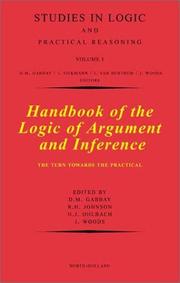
ISBN: 128178141X 9786611781415 0080532918 0444506500 Year: 2002 Publisher: Amsterdam ; Boston : North Holland/Elsevier,
Abstract | Keywords | Export | Availability | Bookmark
 Loading...
Loading...Choose an application
- Reference Manager
- EndNote
- RefWorks (Direct export to RefWorks)
The Handbook of the Logic of Argument and Inference is an authoritative reference work in a single volume, designed for the attention of senior undergraduates, graduate students and researchers in all the leading research areas concerned with the logic of practical argument and inference. After an introductory chapter, the role of standard logics is surveyed in two chapters. These chapters can serve as a mini-course for interested readers, in deductive and inductive logic, or as a refresher. Then follow two chapters of criticism; one the internal critique and the other the emp
Logic, Symbolic and mathematical. --- Mathematics. --- Math --- Science --- Algebra of logic --- Logic, Universal --- Mathematical logic --- Symbolic and mathematical logic --- Symbolic logic --- Mathematics --- Algebra, Abstract --- Metamathematics --- Set theory --- Syllogism

ISBN: 9780444506504 0444506500 9780080532912 0080532918 9786611781415 6611781412 128178141X Year: 2002 Publisher: Boston North Holland/Elsevier
Abstract | Keywords | Export | Availability | Bookmark
 Loading...
Loading...Choose an application
- Reference Manager
- EndNote
- RefWorks (Direct export to RefWorks)
The Handbook of the Logic of Argument and Inference is an authoritative reference work in a single volume, designed for the attention of senior undergraduates, graduate students and researchers in all the leading research areas concerned with the logic of practical argument and inference. After an introductory chapter, the role of standard logics is surveyed in two chapters. These chapters can serve as a mini-course for interested readers, in deductive and inductive logic, or as a refresher. Then follow two chapters of criticism; one the internal critique and the other the emp
Mathematical logic --- Logic, Symbolic and mathematical --- Logic, Symbolic and mathematical. --- Mathematics.
Book
ISBN: 1402063237 9786611044855 1281044857 1402063245 Year: 2007 Publisher: Dordrecht : Springer,
Abstract | Keywords | Export | Availability | Bookmark
 Loading...
Loading...Choose an application
- Reference Manager
- EndNote
- RefWorks (Direct export to RefWorks)
theywereextensivelydiscussedbyallauthorsina3-dayHandbookmeeting. These are: • a chapter on non-monotonic logic • a chapter on combinatory logic and ?-calculus We felt at the time (1979) that non-monotonic logic was not ready for a chapter yet and that combinatory logic and ?-calculus was too far re- 1 moved. Non-monotonic logic is now a very major area of philosop- cal logic, alongside default logics, labelled deductive systems, ?bring l- ics, multi-dimensional, multimodal and substructural logics. Intensive - examinations of fragments of classical logic have produced fresh insights, including at time decision procedures and equivalence with non-classical systems. Perhaps the most impressive achievement of philosophical logic as arising inthepastdecadehasbeenthee?ectivenegotiationofresearchpartnerships with fallacy theory, informal logic and argumentation theory, attested to by the Amsterdam Conference in Logic and Argumentation in 1995, and the two Bonn Conferences in Practical Reasoning in 1996 and 1997. These subjects are becoming more and more useful in agent theory and intelligent and reactive databases. Finally, ?fteen years after the start of the Handbook project, I would like to take this opportunity to put forward my current views about logic in computer science, computational linguistics and arti?cial intelligence. In the early 1980s the perception of the role of logic in computer science was that of a speci?cation and reasoning tool and that of a basis for possibly neat computer languages. The computer scientist was manipulating data structures and the use of logic was one of his options.
Artificial intelligence. --- Linguistics. --- Logic. --- Philosophy. --- Philosophy --- Philosophy & Religion --- Logic --- Argumentation --- Deduction (Logic) --- Deductive logic --- Dialectic (Logic) --- Logic, Deductive --- Mathematics. --- Language and languages --- Philosophy and science. --- Computer logic. --- Mathematical logic. --- Mathematics, general. --- Philosophy of Language. --- Philosophy of Science. --- Logics and Meanings of Programs. --- Mathematical Logic and Formal Languages. --- Intellect --- Psychology --- Science --- Reasoning --- Thought and thinking --- Methodology
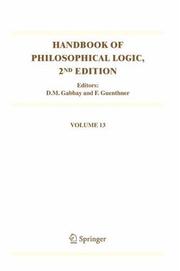
ISBN: 1402035209 9048168902 9786610411726 1280411724 1402035217 079237018X 0792371267 0792371607 1402001398 1402002351 1402005830 1402005997 1402006659 1402006993 1402016441 1402019661 1402030916 9789048158775 9781402002359 9789048160044 9781402005992 9781402006654 9789048160556 9789401745246 9781402019661 1402030924 9781402030918 9781402035203 9781402063237 9789400704848 9400704798 9789400704787 9400766009 9789400766006 9048167892 9786610411702 1280411708 9780792370185 9780792371267 9780792371601 9781402001390 9781402006999 9781402016448 9781402035210 1402063237 9781402063244 904815717X 9401598339 9048157536 940170452X 904815765X 9401704546 904815877X 9401704562 904815927X 9401704589 9048160049 9401704600 9048160111 9401704627 9048160553 9401704643 9048165547 940170466X 9048164311 9401745242 9401039194 9401003874 9781402005831 9400704844 940070478X Year: 2005 Volume: 16 Publisher: Dordrecht ; Boston : Kluwer Academic Publishers,
Abstract | Keywords | Export | Availability | Bookmark
 Loading...
Loading...Choose an application
- Reference Manager
- EndNote
- RefWorks (Direct export to RefWorks)
Intended to comprise some 18 volumes and provides an in-depth coverage of major topics in philosophical logic and its applications in many fields relating to computer science, language, argumentation, and more. This work is aimed at students and researchers whose work or interests involve philosophical logic and its applications.
Logic. --- Philosophy & Religion --- Logic --- Philosophy --- Philosophy. --- Mental philosophy --- Argumentation --- Deduction (Logic) --- Deductive logic --- Dialectic (Logic) --- Logic, Deductive --- Philosophy, general. --- Humanities --- Intellect --- Psychology --- Science --- Reasoning --- Thought and thinking --- Methodology --- Logique --- EPUB-LIV-FT LIVPHILO SPRINGER-B --- Philosophy (General). --- Computational linguistics. --- Computational Linguistics. --- Automatic language processing --- Language and languages --- Language data processing --- Linguistics --- Natural language processing (Linguistics) --- Applied linguistics --- Cross-language information retrieval --- Mathematical linguistics --- Multilingual computing --- Data processing
Book
ISBN: 1280411708 9786610411702 1402030924 Year: 2005 Publisher: Dordrecht ; Boston : Kluwer Academic Publishers,
Abstract | Keywords | Export | Availability | Bookmark
 Loading...
Loading...Choose an application
- Reference Manager
- EndNote
- RefWorks (Direct export to RefWorks)
The first edition of the Handbook of Philosophical Logic (four volumes) was published in the period 1983-1989 and has proven to be an invaluable reference work to both students and researchers in formal philosophy, language and logic. The second edition of the Handbook is intended to comprise some 18 volumes and will provide a very up-to-date authoritative, in-depth coverage of all major topics in philosophical logic and its applications in many cutting-edge fields relating to computer science, language, argumentation, etc. The volumes will no longer be as topic-oriented as with the first edition because of the way the subject has evolved over the last 15 years or so. However the volumes will follow some natural groupings of chapters. Audience: Students and researchers whose work or interests involve philosophical logic and its applications.
Logic. --- Philosophy. --- Mental philosophy --- Humanities --- Argumentation --- Deduction (Logic) --- Deductive logic --- Dialectic (Logic) --- Logic, Deductive --- Intellect --- Philosophy --- Psychology --- Science --- Reasoning --- Thought and thinking --- Methodology --- Philosophy (General). --- Philosophy, general.
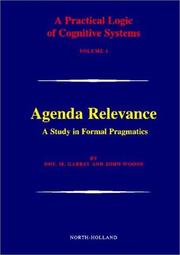
ISBN: 1281034568 9786611034566 008052687X 044451385X 9780444513854 Year: 2003 Publisher: Amsterdam Boston North Holland
Abstract | Keywords | Export | Availability | Bookmark
 Loading...
Loading...Choose an application
- Reference Manager
- EndNote
- RefWorks (Direct export to RefWorks)
Agenda Relevance is the first volume in the authors' omnibus investigation ofthe logic of practical reasoning, under the collective title, A Practical Logicof Cognitive Systems. In this highly original approach, practical reasoning isidentified as reasoning performed with comparatively few cognitive assets,including resources such as information, time and computational capacity. Unlikewhat is proposed in optimization models of human cognition, a practical reasonerlacks perfect information, boundless time and unconstrained access tocomputational complexity. The pract
Logic. --- Pragmatics. --- Pragmalinguistics --- General semantics --- Language and languages --- Logic, Symbolic and mathematical --- Semantics (Philosophy) --- Argumentation --- Deduction (Logic) --- Deductive logic --- Dialectic (Logic) --- Logic, Deductive --- Intellect --- Philosophy --- Psychology --- Science --- Reasoning --- Thought and thinking --- Methodology
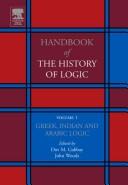
ISBN: 1281054623 9786611054625 0080532861 0444504664 Year: 2004 Publisher: Amsterdam ; London : North-Holland,
Abstract | Keywords | Export | Availability | Bookmark
 Loading...
Loading...Choose an application
- Reference Manager
- EndNote
- RefWorks (Direct export to RefWorks)
Greek, Indian and Arabic Logic marks the initial appearance of the multi-volume Handbook of the History of Logic. Additional volumes will be published when ready, rather than in strict chronological order. Soon to appear are The Rise of Modern Logic: From Leibniz to Frege. Also in preparation are Logic From Russell to Gödel, The Emergence of Classical Logic, Logic and the Modalities in the Twentieth Century, and The Many-Valued and Non-Monotonic Turn in Logic. Further volumes will follow, including Mediaeval and Renaissance Logic and Logic: A History of its Central.In designing the Han
Logic --- Philosophy, Ancient. --- History. --- Ancient philosophy --- Greek philosophy --- Philosophy, Greek --- Philosophy, Roman --- Roman philosophy
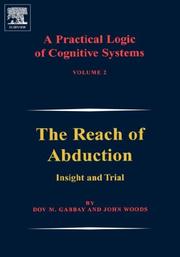
ISBN: 9780444517913 044451791X 0080460925 9780080460925 9786610628834 1280628839 Year: 2005 Publisher: Amsterdam ; Boston : North Holland,
Abstract | Keywords | Export | Availability | Bookmark
 Loading...
Loading...Choose an application
- Reference Manager
- EndNote
- RefWorks (Direct export to RefWorks)
The present work is a continuation of the authors' acclaimed multi-volume APractical Logic of Cognitive Systems. After having investigated the notion ofrelevance in their previous volume, Gabbay and Woods now turn to abduction. Inthis highly original approach, abduction is construed as ignorance-preservinginference, in which conjecture plays a pivotal role. Abduction is a response to acognitive target that cannot be hit on the basis of what the agent currently knows.The abducer selects a hypothesis which were it true would enable the reasoner to attain his target. He co
Logic --- Abduction (Logic). --- Induction (Logic). --- Logic. --- Philosophy.

ISBN: 9780444517913 044451791X 0080460925 9780080460925 1280628839 9786610628834 Year: 2005 Publisher: San Diego, Calif Elsevier
Abstract | Keywords | Export | Availability | Bookmark
 Loading...
Loading...Choose an application
- Reference Manager
- EndNote
- RefWorks (Direct export to RefWorks)
The present work is a continuation of the authors' acclaimed multi-volume APractical Logic of Cognitive Systems. After having investigated the notion ofrelevance in their previous volume, Gabbay and Woods now turn to abduction. Inthis highly original approach, abduction is construed as ignorance-preservinginference, in which conjecture plays a pivotal role. Abduction is a response to acognitive target that cannot be hit on the basis of what the agent currently knows.The abducer selects a hypothesis which were it true would enable the reasoner to attain his target. He co
Logic --- Logic. --- Philosophy.
| Listing 1 - 10 of 25 | << page >> |
Sort by
|

 Search
Search Feedback
Feedback About UniCat
About UniCat  Help
Help News
News